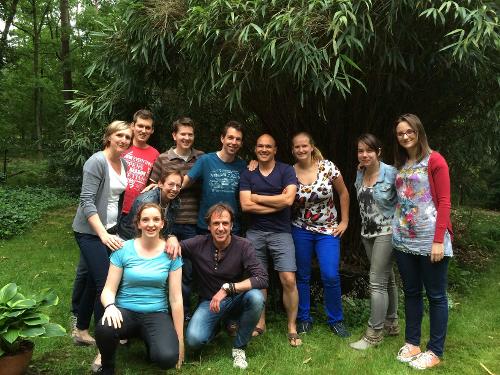Lab
Functional genomics and therapeutics / ENT
|

|
Statement of Research Interest
Usher Syndrome: Genetics, Functional Genomics and Therapeutics
Usher syndrome is genetically and clinically heterogeneous. The syndrome combines hearing impairment, retinitis pigmentosa and in part of the patients vestibular impairment. Usher syndrome type IIa (USH2a), the most common type, is caused by mutations in the USH2A gene. Other genes involved in Usher syndrome are MYO7A, USH1C, CDH23, PCDH15 and USH1G (type I), GPR98 and DFNB31 (type II) and USH3A (type III). Also, defects in the USH2A gene are an important cause of non-syndromic retinitis pigmentosa. Usher proteins co-function in a protein network which explains why defects in genes encoding functionally different proteins are causative for one and the same disorder. We have a specific interest in the USH2A protein and whirlin. Recently, we have shown that NINL, which we identified as an interaction partner of USH2A, connects proteins involved in different retinal degeneration disorders (Usher syndrome, Leber congenital amaurosis and Bardet Biedl syndrome). This suggests an overlap in the molecular pathogenesis of these disorders. Further unravelling of the USH protein network is ongoing by using yeast two-hybrid screening and tandem affinity purification (TAP). The mechanisms of hearing impairment in Usher syndrome are at least partly understood. Those of retinal degeneration in Usher syndrome are largely unknown but the localization of the Usher proteins in the region of the connecting cilium of photoreceptor cells suggests that dysfunction of this structure which heavily functions in transport, is involved. To further study the function of Usher proteins and the mechanisms of retinal degeneration we are introducing zebrafish as a model organism. In this model we shall address therapeutic strategies for USH2A-associated retinal degeneration.
To facilitate DNA diagnostics an Usher mutation chip has been developed in collaboration with Asper Biotech. With the chip all known mutations in all Usher genes identified so far, can be detected. The chip is being updated every 2-3 years and is available for DNA diagnostics via Asper Biotech. The research is a close collaboration between the ENT Department and the Genetics Department.
Usher syndrome is genetically and clinically heterogeneous. The syndrome combines hearing impairment, retinitis pigmentosa and in part of the patients vestibular impairment. Usher syndrome type IIa (USH2a), the most common type, is caused by mutations in the USH2A gene. Other genes involved in Usher syndrome are MYO7A, USH1C, CDH23, PCDH15 and USH1G (type I), GPR98 and DFNB31 (type II) and USH3A (type III). Also, defects in the USH2A gene are an important cause of non-syndromic retinitis pigmentosa. Usher proteins co-function in a protein network which explains why defects in genes encoding functionally different proteins are causative for one and the same disorder. We have a specific interest in the USH2A protein and whirlin. Recently, we have shown that NINL, which we identified as an interaction partner of USH2A, connects proteins involved in different retinal degeneration disorders (Usher syndrome, Leber congenital amaurosis and Bardet Biedl syndrome). This suggests an overlap in the molecular pathogenesis of these disorders. Further unravelling of the USH protein network is ongoing by using yeast two-hybrid screening and tandem affinity purification (TAP). The mechanisms of hearing impairment in Usher syndrome are at least partly understood. Those of retinal degeneration in Usher syndrome are largely unknown but the localization of the Usher proteins in the region of the connecting cilium of photoreceptor cells suggests that dysfunction of this structure which heavily functions in transport, is involved. To further study the function of Usher proteins and the mechanisms of retinal degeneration we are introducing zebrafish as a model organism. In this model we shall address therapeutic strategies for USH2A-associated retinal degeneration.
To facilitate DNA diagnostics an Usher mutation chip has been developed in collaboration with Asper Biotech. With the chip all known mutations in all Usher genes identified so far, can be detected. The chip is being updated every 2-3 years and is available for DNA diagnostics via Asper Biotech. The research is a close collaboration between the ENT Department and the Genetics Department.
Lab Members
| de Vrieze, Erik Post-Doc | Peter, Theo Post-Doc | Slijkerman, Ralph Graduate Student |
| Hetterschijt, Lisette Research Staff |
